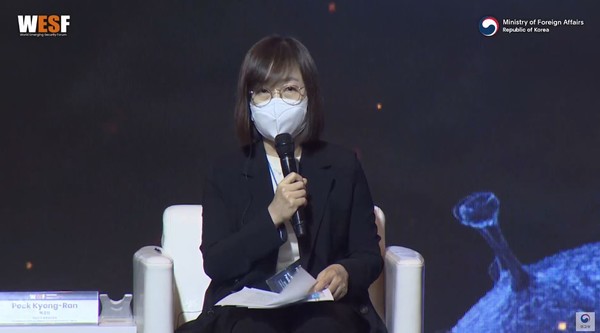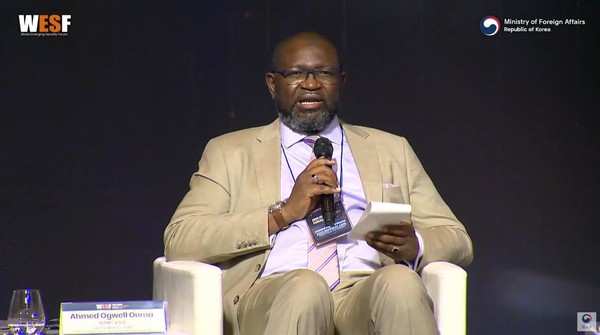International alliances, set up to respond to a global health crisis, failed to play their proper role in containing the Covid-19 pandemic, health experts said.
Thus, they said it is urgent to establish a governance system under which the international community can cooperate to fight a global pandemic.

The Ministry of Foreign Affairs held the 2022 World Emerging Security Forum in Seoul. It opened a session on “Lessons from the Pandemic and Prospects for a Global Pandemic Treaty” on Wednesday.
During the discussion, panelists pointed out that international organizations failed to function correctly during the pandemic.
Peck Kyong-ran, the commissioner of the Korea Disease Control and Prevention Agency (KCDA), said there were some limitations in the pandemic response, such as the failure to predict the possibility of a pandemic at the initial stage of the viral infections. She said that the response also failed to allocate resources like masks, testing kits, vaccines, and treatments across the globe.
“The lack of governance that could encompass the government and private companies made it difficult for individual countries to make efforts to secure capacity to respond to Covid-19 jointly,” Peck said. “There was a limitation to manage Covid-19 without the global collaboration to check and discuss the response situation.”
Another expert said global alliances failed to use their instruments effectively during the pandemic.
Ahmed Ogwell Ouma, Acting Director of Africa Centers for Disease Control and Prevention, said the first lesson learned during the pandemic was that when there was a global crisis, “Africa was literally on its own.”
“Global multilateralism does not work well in a crisis. All the multilateral instruments put in place to address emergencies like Covid19 have systematically failed the continent of Africa,” Ouma said.
He took an example of the WTO’s latest decision to partially relax the Agreement on Trade-Related Aspects of Intellectual Property Rights (TRIPS) on vaccines.
“The WTO Council passed a resolution that did not respond to why the TRIPS flexibilities were negotiated over many painful years,” he said.
WHO prepares ‘pandemic treaty’; Experts call for active participation from the private sector

Experts emphasized that the world should build governance through a “pandemic treaty” to respond to a global health crisis actively.
The WHO has started preparing to draft and negotiate a pandemic treaty that contains international cooperation and rules of conduct to strengthen the global pandemic response.
The WHO is forming an intergovernmental negotiating body (INB) to draft and negotiate a treaty and submit the final report for consideration by the 77th World Health Assembly in 2024.
Ouma pointed out a disparity in sharing information among countries during Covid-19. “But if one region is at risk, other regions could be at risk, too. There should be countermeasures,” he said.
Peck also said countries should build a tool to share information early to quickly respond to the initial stage of a pandemic and establish infrastructure to enhance fast and equitable access to essential drugs, including vaccines and treatments.
She called for the private sector to participate in the negotiations for a pandemic treaty.
Covid-19 vaccines were produced in a short time because companies have established capacity for mass production through investments in technologies, she went on to say.
“As the private sector filled the gaps that the WHO or the government could not engage in, they should be able to become key players in the pandemic treaty,” she said.
Ouma also said that the private sector’s contribution to building health security would benefit themselves because they suffered setbacks in economic activities during the Covid-19 pandemic.
“The government should give incentives to the private sector to encourage their active participation,” he said.

